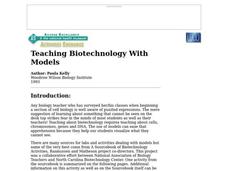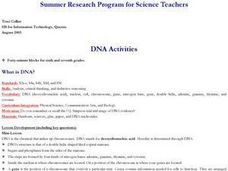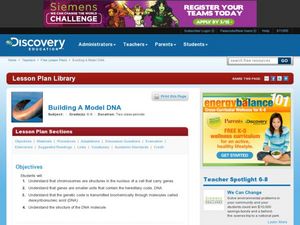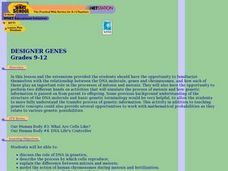Curated OER
Games and Activities to Teach Molecular Genetics
High schoolers demonstrate a working knowledge of cell interactions such as DNA replication, protein synthesis (transcription and translation), through active participation in a cooperative group.
Curated OER
Teaching Biotechnology With Models
Students are introduced to biotechnology by using models. The teacher uses A Sourcebook of Biotechnology Activities, Rasmussen and Matheson project co directors. One of the activities in the book is: students use a scale models to very...
Curated OER
DNA Activities
Students work together to identify the structure of DNA. They practice using new vocabulary as well. They create a 3-D model of DNA to complete the instructional activity.
Curated OER
Genes and Chromosomes
In this DNA learning exercise, students will review vocabulary about the structure and characteristics of DNA and the processes of replication and mutation. 3 true or false questions, 6 matching questions, 5 fill in the blank statements.
Curated OER
Genetics DNA Replication
Students explore DNA replication. Beginning with a teacher led discussion, students examine inherited information, genes, and Deoxyribose Nucleic Acid (DNA). As the teacher models the structures of DNA, tells about the contributions of...
Curated OER
DNA Model and Protein Synthesis
Learners build a 3-dimensional model of DNA coding for the hormone oxytocin.
Curated OER
DNA
Students explore the basics of DNA and its history. In this DNA lesson students extract DNA from fruits and understand how it is used in forensics.
Curated OER
What is the Relationship Between DNA and Cancer?
High schoolers examine the structure and functions of DNA. They discover the effects radon has on one's DNA and how it leads to cancer. They discuss why DNA is so important to us.
Curated OER
Building a Model DNA
Pupils explain the function of DNA in the body. In this biology lesson, students build a DNA model using simple materials. They demonstrate how bases pair up in the helix.
Curated OER
DNA and RNA
Tenth graders research the history and discovery of DNA. Using their text, they label a basic DNA structure and the composition of genes. They explain how RNA and DNA differ from one other and discuss the processes of transcription and...
Curated OER
DNA Replication
After viewing this presentation, students create a complete set of notes to support their learning of DNA replication. Each slide has information on a step in DNA synthesis process. The slides focus primarily on the processes rather than...
Curated OER
Strawberry Smoothies
Biologists extract the DNA from a strawberry. After completing the procedure, learners write answers to a few questions on the lab sheet provided. This is ideal lab practice during a DNA unit in your general biology course.
Curated OER
The Cell Cycle: Cell Growth, Cell Division
Help your students understand cell division. Explore the topics of mitosis by examining the details of chromosomes at interphase, metaphase, anaphase, prophase, and telophase. Wonderful slides will keep your students' attention...
Howard Hughes Medical Institute
Central Dogma and Genetic Medicine
Scientists work every day to find solutions to genetic diseases. Scholars learn about the process of gene sequencing, mutations, and the results. They explore genetic diseases and therapies to intervene and help and, through case...
Biology Junction
Nucleic Acids
Genetic information transfers through nucleic acids, making these the chemical link that connects people to their parents and grandparents. Viewers determine the importance of both DNA and RNA after observing the presentation. Key...
Curated OER
Pete And Repeat
Students draw a picture of a person from popular culture, then "clone" it using printing techniques in this Art lesson that tackles the questions surrounding cloning, DNA, and current scientific techniques. An emphasis is placed on the...
Biology Junction
Nucleic Acids
In this DNA instructional activity, students identify the different parts of the DNA and color them. They complete 16 short answer and fill in the blank questions on DNA.
Curated OER
Who's Who and How Do You Know for Sure?
Young scholars investigate the applications of DNA fingerprinting, They read crime scenarios and using the details of the crime and laboratory experimentation decide the suspects guilt or innocence.
Curated OER
DNA in a "Snap"
Students observe a model of DNA and answer probing questions like, "What does this model represent?" They then work in small groups to construct an accurate model of DNA per rubric provided and present to the class explaining their model...
Curated OER
DNA: What Does It Mean?
Tenth graders explore DNA using online tutorial. They perform their own DNA extraction from a clove of garlic and identify the key components of DNA.
Curated OER
Designer Genes
Students view a video on DNA. They discuss mitosis, meiosis and fertilization. They use strips of paper to simulate fertilization and analyze the genotype and phenotype of the combined chromosomes.
Curated OER
Human Genetics and Heredity
Learners choose topics for research based on human genetics and heredity. They conduct research via the Internet and write a brief explanation of the milestone in genetics and heredity and attach it to a class timeline. They share...
Curated OER
Teaching Biotechnology With Models
Students will construct models to obtain understanding about the scientific concept. The kinesthetic learners will benefit from the project. There is ample opportunity for all types of learners to be engaged in this lesson.
Curated OER
Unit 5 DNA & Protein Synthesis
Students study and examine DNA and protein synthesis. Students decide what grade they want and complete only those assignment's. There are no objectives listed for this lesson plan.

























